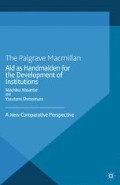Abstract
As was described in Chapter 6, the Brantas River Basin Development Plan in Indonesia was supported by Japan’s financial and technical assistance. It not only successfully produced individual project outcomes, but also promoted institutional evolution, policy improvement and endogenous human resource enhancement that had an effect in regions beyond the Brantas river basin. In contrast, the Kilimanjaro Agriculture Development Programme in Tanzania, also a long-term public infrastructure investment financially and technically supported by Japan, has not as yet produced the hoped-for impact in terms of institutional evolution, policy improvement and human resource enhancement, although certain individual projects have attained some success. What were the causes behind this distinct difference between the two infrastructure projects?
Access this chapter
Tax calculation will be finalised at checkout
Purchases are for personal use only
Preview
Unable to display preview. Download preview PDF.
References
Acharya, A., A. De Lima and M. Moore (2006) ‘Proliferation and Fragmentation: Transactions Costs and the Value of Aid’, Journal of Development Studies 42 (1): 1–21.
Cordella, T. and G. Dell’ Ariccia (2007) ‘Budget Support versus Project Aid: A Theoretical Appraisal’, The Economic Journal 117 (523): 1260–79.
Dasgupta, P. (2001) Human Well-Being and the Natural Environment. Oxford: Oxford University Press.
Djankov, S., J.G. Montalvo and M. Reynal-Querol (2008) ‘The Curse of Aid’, Journal of Economic Growth 13: 169–94.
JBICI (2008) ‘Aid Effectiveness to Infrastructure: A Comparative Study of East Asia and Sub-Saharan Africa — Case Studies of Sub-Saharan Africa’, JBICI Research Paper 36–3, July. Tokyo: JBICI Institute.
Kanbur, R. and T. Sandler (1999) ‘The Future of Development Assistance: Common Pools and International Public Goods’, ODC Policy Essay No. 25. Washington, DC: Overseas Development Council.
Kharas, H. (2007) ‘Trends and Issues in Development Aid’, Working Paper 1. Washington, DC: Wolfensohn Center for Development, Brookings Institution.
Knack, S. and A. Rahman (2007) ‘Donor Fragmentation and Bureaucratic Quality in Aid Recipients’, Journal of Development Economics 83 (1): 176–97.
Martens, B., U. Mummert, P. Murrell and P. Seabright (2002) The International Economics of Foreign Aid. Cambridge, MA: Cambridge University Press.
Sato, J., H. Shiga, T. Kobayashi and H. Kondoh (2011) ‘Emerging Donors from a Recipient Perspective: An Institutional Analysis of Foreign Aid in Cambodia’, World Development 39(12): 2091–104.
World Bank (1994) Adjustment in Africa: Reforms, Results, and the Road Ahead. New York: Oxford University Press.
Editor information
Editors and Affiliations
Copyright information
© 2013 Kazuto Tsuji
About this chapter
Cite this chapter
Tsuji, K. (2013). Institutional Comparative Study of Brantas (Indonesia) and Kilimanjaro (Tanzania) — and Its Policy Implications. In: Nissanke, M., Shimomura, Y. (eds) Aid as Handmaiden for the Development of Institutions. Palgrave Macmillan, London. https://doi.org/10.1057/9781137023483_7
Download citation
DOI: https://doi.org/10.1057/9781137023483_7
Publisher Name: Palgrave Macmillan, London
Print ISBN: 978-1-349-43822-8
Online ISBN: 978-1-137-02348-3
eBook Packages: Palgrave Economics & Finance CollectionEconomics and Finance (R0)

